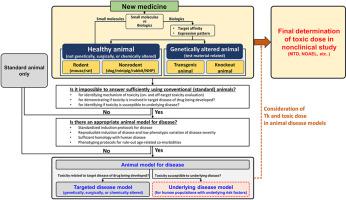当前位置:
X-MOL 学术
›
Food Chem. Toxicol.
›
论文详情
Our official English website, www.x-mol.net, welcomes your feedback! (Note: you will need to create a separate account there.)
Potential impact of underlying diseases influencing ADME in nonclinical safety assessment
Food and Chemical Toxicology ( IF 4.3 ) Pub Date : 2024-04-04 , DOI: 10.1016/j.fct.2024.114636 Sumin Cho , Harin Jo , Yeon Jeong Hwang , Changuk Kim , Yong Hyeon Jo , Jun-Won Yun
Food and Chemical Toxicology ( IF 4.3 ) Pub Date : 2024-04-04 , DOI: 10.1016/j.fct.2024.114636 Sumin Cho , Harin Jo , Yeon Jeong Hwang , Changuk Kim , Yong Hyeon Jo , Jun-Won Yun

|
Nonclinical studies involve and experiments to assess the toxicokinetics, toxicology, and safety pharmacology of drugs according to regulatory requirements by a national or international authority. In this review, we summarize the potential effects of various underlying diseases governing the absorption, distribution, metabolism, and excretion (ADME) of drugs to consider the use of animal models of diseases in nonclinical trials. Obesity models showed alterations in hepatic metabolizing enzymes, transporters, and renal pathophysiology, which increase the risk of drug-induced toxicity. Diabetes models displayed changes in hepatic metabolizing enzymes, transporters, and glomerular filtration rates (GFR), leading to variability in drug responses and susceptibility to toxicity. Animal models of advanced age exhibited impairment of drug metabolism and kidney function, thereby reducing the drug-metabolizing capacity and clearance. Along with changes in hepatic metabolic enzymes, animal models of metabolic syndrome-related hypertension showed renal dysfunction, resulting in a reduced GFR and urinary excretion of drugs. Taken together, underlying diseases can induce dysfunction of organs involved in the ADME of drugs, ultimately affecting toxicity. Therefore, the use of animal models of representative underlying diseases in nonclinical toxicity studies can be considered to improve the predictability of drug side effects before clinical trials.
中文翻译:

影响ADME的基础疾病对非临床安全性评估的潜在影响
非临床研究涉及根据国家或国际当局的监管要求评估药物的毒代动力学、毒理学和安全药理学的实验。在这篇综述中,我们总结了各种控制药物吸收、分布、代谢和排泄(ADME)的潜在疾病的潜在影响,以考虑在非临床试验中使用疾病动物模型。肥胖模型显示肝脏代谢酶、转运蛋白和肾脏病理生理学的改变,这增加了药物引起的毒性的风险。糖尿病模型显示肝脏代谢酶、转运蛋白和肾小球滤过率 (GFR) 的变化,导致药物反应和毒性易感性的变化。高龄动物模型表现出药物代谢和肾功能受损,从而降低药物代谢能力和清除率。随着肝脏代谢酶的变化,代谢综合征相关高血压的动物模型表现出肾功能障碍,导致肾小球滤过率(GFR)和药物尿排泄降低。综合起来,基础疾病会导致参与药物 ADME 的器官功能障碍,最终影响毒性。因此,在非临床毒性研究中可以考虑使用代表性基础疾病的动物模型,以提高临床试验前药物副作用的可预测性。
更新日期:2024-04-04
中文翻译:

影响ADME的基础疾病对非临床安全性评估的潜在影响
非临床研究涉及根据国家或国际当局的监管要求评估药物的毒代动力学、毒理学和安全药理学的实验。在这篇综述中,我们总结了各种控制药物吸收、分布、代谢和排泄(ADME)的潜在疾病的潜在影响,以考虑在非临床试验中使用疾病动物模型。肥胖模型显示肝脏代谢酶、转运蛋白和肾脏病理生理学的改变,这增加了药物引起的毒性的风险。糖尿病模型显示肝脏代谢酶、转运蛋白和肾小球滤过率 (GFR) 的变化,导致药物反应和毒性易感性的变化。高龄动物模型表现出药物代谢和肾功能受损,从而降低药物代谢能力和清除率。随着肝脏代谢酶的变化,代谢综合征相关高血压的动物模型表现出肾功能障碍,导致肾小球滤过率(GFR)和药物尿排泄降低。综合起来,基础疾病会导致参与药物 ADME 的器官功能障碍,最终影响毒性。因此,在非临床毒性研究中可以考虑使用代表性基础疾病的动物模型,以提高临床试验前药物副作用的可预测性。






























 京公网安备 11010802027423号
京公网安备 11010802027423号